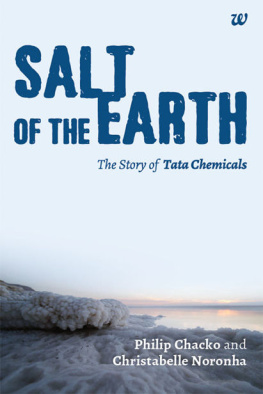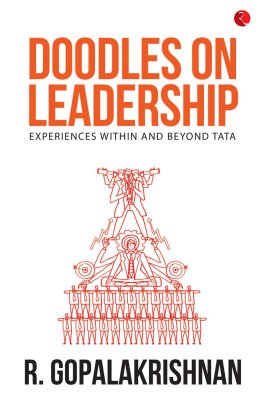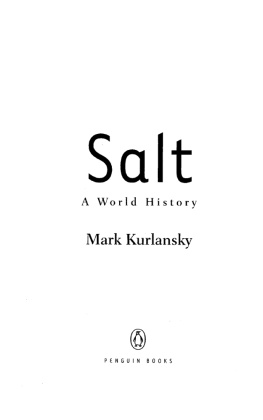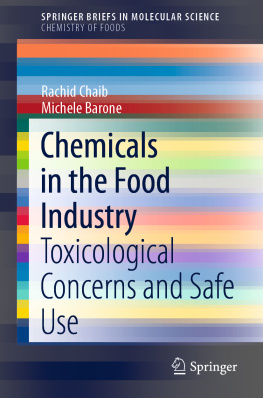

Philip Chacko
and
Christabelle Noronha

westland ltd
61, 2nd Floor, Silverline Building, Alapakkam Main Road, Maduravoyal, Chennai 600 095
93, 1st Floor, Sham Lal Road, Daryaganj, New Delhi 110 002
First published by westland ltd, 2014
First ebook edition: 2014
Copyright Tata Chemicals Limited
All rights reserved
ISBN: 978-93-84030-75-9
Typeset by PrePSol Enterprises Pvt. Ltd.
This book is sold subject to the condition that it shall not by way of trade or otherwise, be lent, resold, hired out, circulated, and no reproduction in any form, in whole or in part (except for brief quotations in critical articles or reviews) may be made without written permission of the publishers.
Chlorine is a deadly poison gas employed on European battlefields in World War I. Sodium is a corrosive metal which burns upon contact with water. Together they make a placid and nonpoisonous material, table salt. Why each of these substances has the properties it does is a subject called chemistry.
Carl Sagan,
Broca's Brain: The Romance of Science
Contents
Foreword
By R Gopalakrishnan
Vice Chairman, Tata Chemicals
W riting the foreword of a book on Tata Chemicals is difficult for me. I cannot hide my biases because I have been the vice chairman of the company's board of directors for more than 15 years. So I decided that I should not devote this foreword to any extended account of Tata Chemicals. In another sense, it is rewarding for me to write it because I have been in the chemical industry for all of the 47 years of my professional career.
The chemical industry is not easy to understand; common folk are prone to think of it as being unfriendly to the environment. In reality this industry is about happiness: it provides chemistry-based solutions that promote wellbeing in society. I will refer to the four I's of this industry: importance, innovativeness, inclusiveness and identity.
Importance
The chemical industry is critical for consumers, for industrial and agricultural development, and for human and animal health. However, it is neither proportionately visible nor palpable in its economic presence, not just in India but even globally. The size of the global chemicals market was estimated at $3.7 trillion in 2012, accounting for 5 percent of global GDP; comparatively, the global automotive and steel industry markets, taken together, were $5.3 trillion.
The Indian chemicals market was estimated at $108 billion in fiscal 2013, just 3 percent of the global market, though India has 16 percent of the global population. This demonstrates the headroom for growth that the chemicals market has in the country. The industry makes a heavy contribution of 12 percent to the Index of Industrial Production, which indicates its importance to industrial production in India. In comparison, power contributes 0.3 percent, steel 6.7 percent, and automotive 5.9 percent. The chemical industry provides employment to about half million people and is a net contributor to India's foreign exchange earnings.
The global chemical industry produces well over 70,000 different chemical substances, generated by decades of intensive research and development. Several breakthrough innovations have emerged from chemical laboratories, including plastics, PVC, polyester, nylon, crop chemicals and crop nutrients. The industry, one of the largest industrial sectors in the world, provides many essential products for everyday life, thus making human existence safer, healthier and more productive.
Most of the industry's products are not consumerfacing, but are used by other industries (over 80 percent of it). The effects of chemical innovation are, therefore, not directly felt or recognised by consumers. The layperson remains blissfully unaware of the industry's role and its contributions.
Innovativeness
Imagine that three people get together, one who had lived around the 1850s, another around 1925 and the third in the modern world. How would they view what was totally new, and measure the pace of change?
The 1850s person would not know of disinfectants and anaesthetics. For him, any form of surgery was a call to insufferable pain, if not death. Imagine the amount of pain our great grandfathers would have gone through when they fell sick or contracted a disease requiring surgery. In that era, a person died either because of the disease, the trauma of an operation, or infections happening during or after the operation (also known as ward fever).
The 1925 person would recognise two of the biggest contributions of the chemical industry as chloroform (adapted by James Y Simpson in 1847 and used as an anaesthetic) and carbolic acid (adapted by Joseph Lister in 1865 and used as a disinfectant). These innovations not only drastically brought down the mortality rate but also revolutionised the healthcare industry.
This 1925 person would have heard about Thomas Robert Malthus and looming food shortages as the population
of the planet was forecast to rapidly rise. The concept of fertilising the soil with nutrients, or enhancing the output of plants with organically synthesised plant-protection chemicals would have been new to him.
While chloroform and carbolic acid helped reduce mortality, the consequent growth in the world population required an adequate supply of food and nutrients. Thanks to the path-breaking ammonia synthesis process discovered by Fritz Haber and Carl Bosch in 1909, there is enough food for today's 7 billion people. This technology has made arguably the greatest difference to humankind in the 20th century. Agricultural production was further bolstered by the invention of synthetic organics for crop protection.
The evolution of the chemical industry can be metaphorically related to the evolutionary development of the brain. Evolution moved from reptiles to mammals. It was one of the mammal species that took the disruptive step of walking upright. This resulted in a redistribution of blood supply, which was no more needed for the front haunches, elbows and paws. It accelerated the development of brain functions in humans and transformed the entire living ecosystem. We now know that the human brain makes up only 2 percent of bodyweight, but consumes 20 percent of the body's energy.
The chemical industry too has undergone similar changes. The industry evolved by:
Making natural substances cheaper to produce in an industrial plant; examples: the synthetic indigo process (1897) and the Haber-Bosch nitrogen-fixation process (1912).
Creating chemical substances that do not naturally occur on earth; example: the world's first petrochemical plant was set up in 1920 by Union Carbide Corporation in West Virginia, USA.
Developing specialty products to satisfy specific cus tomer needs; example: production of nylon 6 for stockings, toothbrushes, tents and ropes.
As this industry evolved, more products were introduced and more customer segments were impacted (agriculture, manufacturing and construction). Consequently, the industry has got more and more of a business-to-business focus in the last 50 years. I wonder whether the innovations of the chemical industry have become invisible to consumers, leading to them being perceived as incremental rather than game-changing.
The chemical industry is at a fork in its journey. It now awaits a big transformation to be able to take the next leap forward and redefine the ecosystem, as the upright, walking humanoid did. This could change the way the industry is perceived.
Next page












